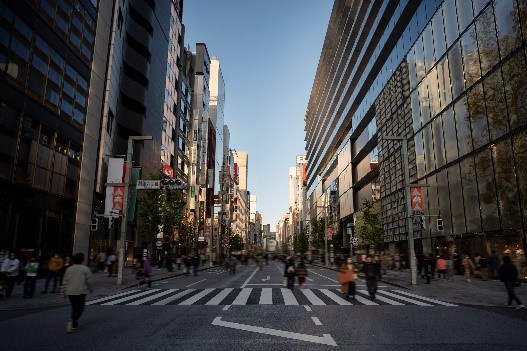JAPAN EMERGES FROM RECESSION ON POST-COVID CONSUMER REBOUND

Japan Q1 GDP growth tops expectations
- Consumption rises 0.6% qtr/qtr vs f’cast +0.4%
- Business spending unexpectedly rises
- Weak external demand shaves off GDP
- Nominal GDP hits 570.1 trln yen, record above pre-COVID high
Japan’s economy emerged from recession and grew faster than expected in the first quarter as a post-COVID consumption rebound offset global headwinds, shoring up hopes for a sustained recovery.
But mounting signs of a slowdown in U.S., European and Chinese growth cloud the outlook for the export-reliant economy, heightening uncertainty on how soon the central bank can phase out its massive stimulus programme, Reuters reported.
“Consumption will continue to underpin growth as removal of COVID curbs boost tourism and service spending,” said Yoshiki Shinke, chief economist at Dai-ichi Life Research Institute.
“But the economic recovery will be moderate as weak overseas demand will weigh on exports. It will be a tug-of-war between robust domestic demand and sluggish exports”, he said.
The world’s third-largest economy grew an annualised 1.6% in January-March, government data showed on Wednesday, far exceeding market forecasts for a 0.7% gain and marking the first rise in three quarters.
The growth followed a 0.1% fall in the final quarter of last year, which was revised down from a 0.1% rise. The decline marked two straight quarters of contraction, meeting the definition of a technical recession.
Private consumption, which makes up more than half the economy, grew 0.6% in January-March from the previous quarter, as the country’s re-opening from the pandemic boosted service spending. That beat forecasts of a 0.4% increase.
Capital expenditure also surprised, expanding 0.9%, confounding forecasts for a 0.4% fall.
Japan’s nominal gross domestic product (GDP) reached a record 570.1 trillion yen ($4.22 trillion), helped in part by rising prices, economy minister Shigeyuki Goto said.
However, Goto said caution was required amid emerging risks.
“We must meticulously pay heed to the global economy, and impacts from financial markets and rises in interest rates on real economy,” he said.
The strength in domestic demand offset weakness in exports, which slumped 4.2% in January-March, marking the first decline in six quarters.
External demand, or net exports, shaved 0.3 of a percentage point off GDP, highlighting the strain on manufacturers from slowing overseas growth.
“Demand for goods isn’t strong globally, so exports are weak. Industrial production is also soft, so we can’t expect manufacturers to perform well ahead,” said Toru Suehiro, an economist at Daiwa Securities.
Rising fuel and food costs, which drove Japan’s consumer inflation above the central bank’s 2% target, could also weigh on consumption unless wage hikes are sustained, analysts say.
Inflation-adjusted wages fell 2.3% in January-March from a year earlier, more than a 1.8% drop in the previous quarter, highlighting the deepening pain on households from rising living costs.
Source: Reuters














